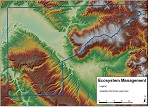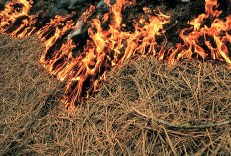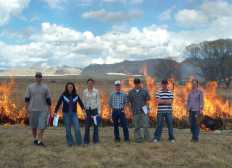ENVS101: Introduction To Environmental Science
 Course Description:
This is a non-majors course that meets General Education requirements. Students will learn how the scientific method is used to understand environmental problems; apply the concept of sustainability to water, energy, soil, and biodiversity; analyze the specific effects of humans on the environment and why the effects may differ in different societies; express well-reasoned opinions about current environmental issues including their causes, consequences, and the pros and cons of possible solutions; and improve their environmental literacy. I teach both traditional and fully online versions of this course.
Course Description:
This is a non-majors course that meets General Education requirements. Students will learn how the scientific method is used to understand environmental problems; apply the concept of sustainability to water, energy, soil, and biodiversity; analyze the specific effects of humans on the environment and why the effects may differ in different societies; express well-reasoned opinions about current environmental issues including their causes, consequences, and the pros and cons of possible solutions; and improve their environmental literacy. I teach both traditional and fully online versions of this course.
ENVS104: Global Sustainability
 Course Description:
This course is the introductory course for Environmental Science majors. In it, we study the scientific basis of several important environmental issues affecting us today such as: global climate change, energy use, the effects of agriculture, air pollution, water quality and quantity, ozone depletion, and the loss of biodiversity. We also cover important historical readings to help students better understand the context of our current environmental issues.
Course Description:
This course is the introductory course for Environmental Science majors. In it, we study the scientific basis of several important environmental issues affecting us today such as: global climate change, energy use, the effects of agriculture, air pollution, water quality and quantity, ozone depletion, and the loss of biodiversity. We also cover important historical readings to help students better understand the context of our current environmental issues.
ENVS204 and Lab: Introduction To Ecosystem Management
 Course Description:
In this required course (lecture and lab) for ENVS majors, students learn about concepts used in ecosystem management and how to apply them to various natural resource management issues in Western Colorado. Students also get a firm understanding of the scientific method by conducting a field study and writing the results in the format of a formal scientific paper and a scientific poster. Students also learn how to identify at least 20 local plant species and 5 different field methods for estimating plant abundance.
Course Description:
In this required course (lecture and lab) for ENVS majors, students learn about concepts used in ecosystem management and how to apply them to various natural resource management issues in Western Colorado. Students also get a firm understanding of the scientific method by conducting a field study and writing the results in the format of a formal scientific paper and a scientific poster. Students also learn how to identify at least 20 local plant species and 5 different field methods for estimating plant abundance.
ENVS360: Forest Ecology

Course Description: In this lecture course, students learn how trees and forests function to provide ecosystem services, the mechanisms of forest regeneration, how the forest carbon cycle works, the interaction of nutrient cycling and forest soils, the role of forest insect epidemics, how climate change may affect forests, and techniques for managing forests sustainably.
ENVS360: Fire Ecology

Course Description: This course is the first part of a 2-course series designed to give students an in-depth understanding of fire ecology and fire management. This course will focus on fire as an ecological process in forests, shrublands, and grasslands. Drawing upon ecological theories of disturbance and succession, we study how fire affects all components of an ecosystem, including plants, animals, soil, and water. We focus on ecosystems of the Colorado Plateau, but fire ecology concepts will also be reinforced using examples of fire-maintained ecosystems throughout the U.S. and the world. The course focuses on the natural and/or historical role of fire in these ecosystems, how changing fire regimes have altered these ecosystems, and how fire can be used for their restoration.
ENVS460: Fire Management
 Course Description:
This course is the second part of a 2-course series designed to give students an in-depth understanding of fire ecology and fire management. Students will learn how to measure fuel loads and fuel moisture, model fire behavior using BehavePlus software, develop a prescribed fire and smoke management plan, and how to make home and communities in the WUI firewise. Students complete a semester-long group project where they use a computer model (BehavePlus) to model crown fire behavior of an actual ponderosa pine stand and develop fuel reduction plans that will make their forest plot resistant to fire under extreme weather conditions.
Course Description:
This course is the second part of a 2-course series designed to give students an in-depth understanding of fire ecology and fire management. Students will learn how to measure fuel loads and fuel moisture, model fire behavior using BehavePlus software, develop a prescribed fire and smoke management plan, and how to make home and communities in the WUI firewise. Students complete a semester-long group project where they use a computer model (BehavePlus) to model crown fire behavior of an actual ponderosa pine stand and develop fuel reduction plans that will make their forest plot resistant to fire under extreme weather conditions.
ENVS492: Capstone in Environmental Science and Technology
Course Description: This is a required course that Environmental Science majors take in their final spring semester. Students design and complete a team project addressing an environmental issue for a local client. The project culminates in a professional presentation and report. Students also gain practice preparing resumes, writing cover letters, and interviewing for jobs.
On-line courses for Federal employees in the 401 series
I also offer on-line Fire Ecology and Forest Ecology courses for federal employees.